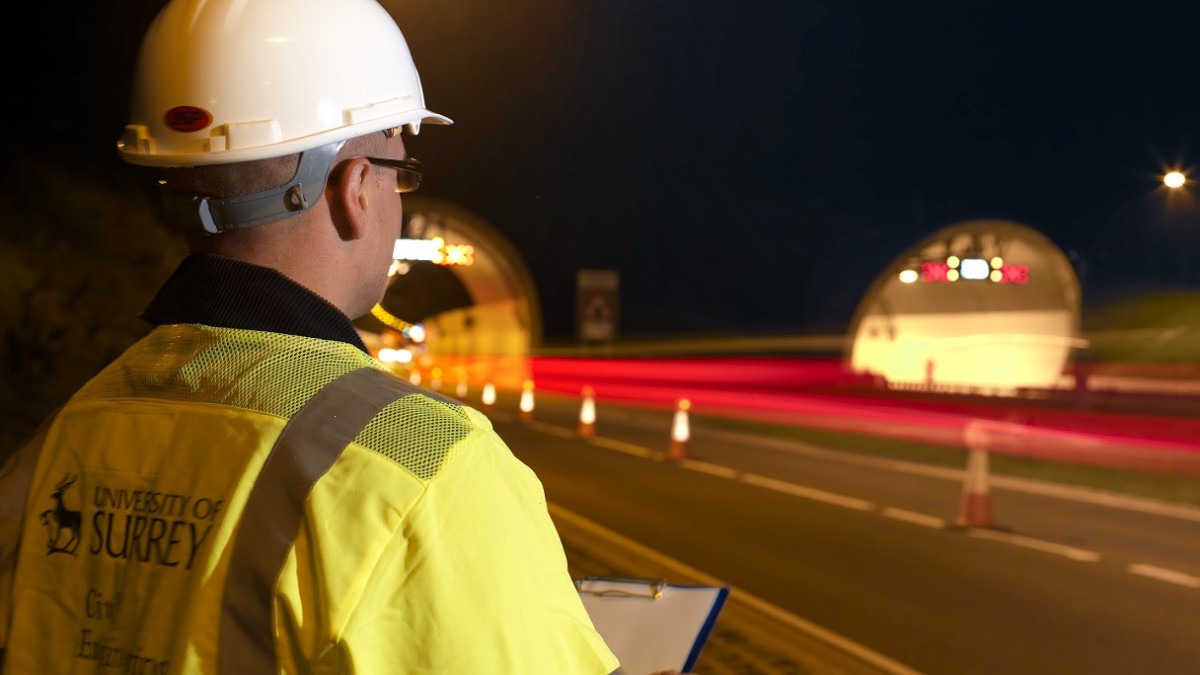Five reasons to study for a masters in civil and environmental engineering at Surrey
What makes our civil and environmental engineering MSc courses different? Here are five reasons why studying with us can open the door to a world of opportunities.

A civil engineering student assesses the entrance to Hindhead Tunnel under the Devil's Punch Bowl in Surrey.
1. Wide range of modules
You can specialise in a fascinating field of civil engineering which feeds into a specific area of industry on our Advanced Geotechnical Engineering MSc, Infrastructure Engineering and Management MSc, Structural Engineering MSc, Water and Environment Engineering MSc, or our unique and long-established Bridge Engineering MSc – the only course of its type in Europe. Alternatively, you can study on our Civil Engineering MSc, enabling you to tailor the course to your interests and career aspirations. Our multi-disciplinary approach means that students on all our MSc programmes have the option of choosing modules from a wide range.
2. Teaching by research-active academics
Surrey is home to globally significant research in many fascinating fields of civil engineering - such as environmental health, geotechnical engineering, water and wastewater treatment, infrastructure systems engineering, and asset management. We have collaborated extensively with infrastructure organisations such as Network Rail, Highways England and Thames Water in UK and European projects, and also work with the World Health Organization (WHO) through our Centre for Environmental Health and Engineering, which is a WHO Collaborating Centre for the protection of water quality and health. At Surrey this important research informs our teaching: you’ll learn from academics who are leading the way in these fields and possibly get involved in a real-world project during your dissertation.
3. Flexible course format
You can study for our masters courses in a way that suits your career stage and current commitments. You may opt to study full-time (for one year), part-time (2 to 5 years), or choose our Distance Learning option (2 to 5 years). Distance Learning enables you to study any of our MSc programmes from anywhere in the world. Our Distance Learners access module materials and lecture recordings, and participate in online discussions, via our virtual online environment (SurreyLearn), and receive all the support they need from our dedicated tutors. Individual modules can also be taken as part of Continuing Professional Development (CPD).
4. Professionally accredited
All our masters courses are fully accredited by the Institution of Civil Engineers (ICE), Institution of Structural Engineers (IStructE), Institute of Highway Engineers, Chartered Institution of Highways and Transportation, and European Accreditation of Engineering Programmes (EUR-ACE). All our programmes meet the requirements for Further Learning towards becoming a Chartered Engineer (CEng).
5. Great employment prospects
Studying for a masters in civil and environmental engineering at Surrey opens up a huge range of career opportunities not only with major consultancies and contractors but also across other sectors such as management and business consultancy.
Recent graduates of our MSc courses have recently been employed in roles such as Graduate Engineer or Bridge Engineer at Atkins, WSP, AECOM, Amey and Mott MacDonald; Project Manager at WSP, Mott MacDonald and Laing O'Rourke; Consultant Engineer in Asset Management at WRc plc; Structural Engineer at ARUP, Arcadis, Fluor, AECOM; and Civil Engineer at Capita Real Estate and Infrastructure and Peter Brett Associates.
According to the Graduate Outcomes Survey 2022, 95 per cent of Surrey's postgraduate taught students are in work or full-time study after graduating, and the average starting salary after taking a masters in civil and environmental engineering is £33,170.
Discover our masters courses in civil and environmental engineering.